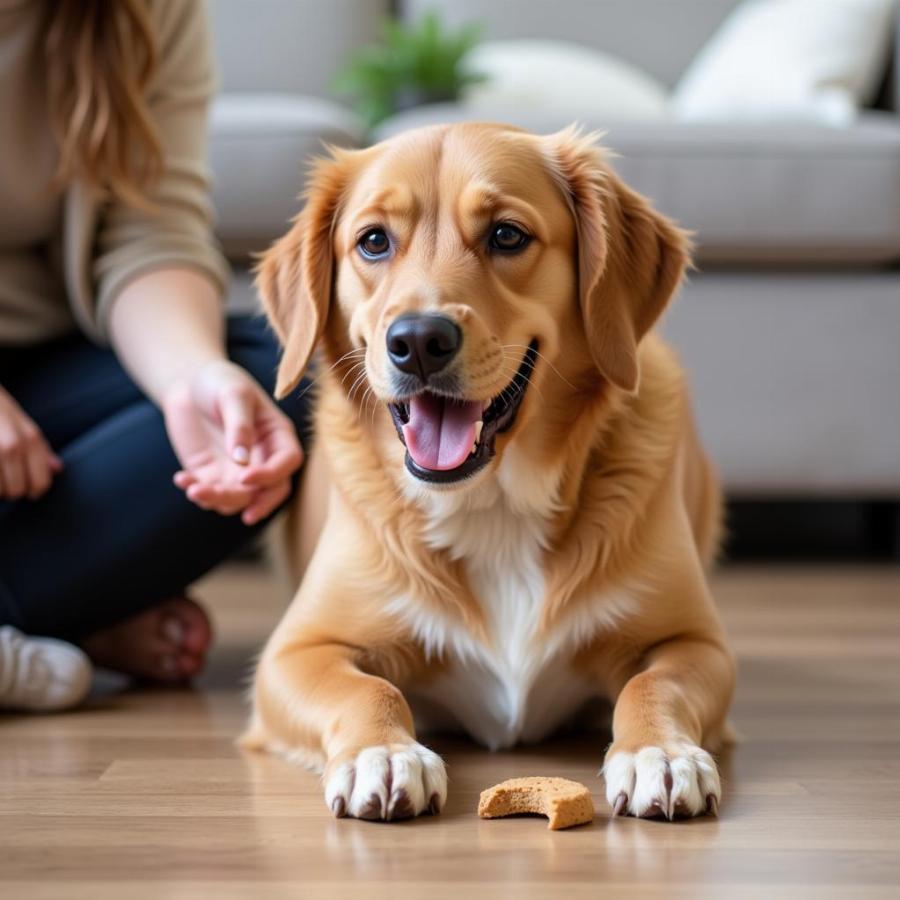If your dog ate a bar of soap, you’re likely feeling worried. This is a common scenario and understanding what to do next is crucial. This article will guide you through the necessary steps, from assessing the situation to seeking veterinary care if needed. We’ll cover different types of soap, potential dangers, symptoms to watch for, and how to prevent this from happening again.
Understanding the Risks of Soap Ingestion in Dogs
The first step is determining the type of soap your dog consumed. Different soaps pose varying risks. Hand soaps, often containing fragrances and moisturizers, can cause gastrointestinal upset. Dish soaps, designed to cut grease, are more concerning due to their corrosive nature. Bar soaps, depending on their ingredients, can also range from mild irritants to more serious threats. Even “natural” soaps can cause problems. The size of your dog and the amount of soap ingested are also key factors. A small dog eating a large amount of soap is obviously a bigger concern than a large dog eating a small sliver.
Signs and Symptoms to Watch For After Soap Ingestion
After your dog eats soap, watch closely for any signs of distress. Common symptoms include vomiting, diarrhea, drooling, loss of appetite, and lethargy. More serious signs include difficulty breathing, tremors, seizures, and loss of coordination. These could indicate a more severe reaction and require immediate veterinary attention.
What to Do if Your Dog Ate Soap
If your dog ate soap, remain calm and assess the situation. First, identify the type of soap and the amount ingested. Then, contact your veterinarian or an animal poison control center immediately. They can provide tailored advice based on your dog’s breed, size, and the specific soap involved. Do not induce vomiting unless instructed by a veterinarian.
Preventing Future Soap Consumption
Prevention is always better than cure. Keep all soaps out of your dog’s reach. Store them in closed cabinets, drawers, or high shelves. Consider using soap dispensers that are difficult for dogs to access. Train your dog basic obedience commands like “leave it” to deter them from grabbing anything potentially harmful.
How to Train Your Dog to “Leave It”
This command is invaluable in preventing your dog from eating things they shouldn’t. Start by holding a treat in your closed fist. When your dog tries to get it, say “leave it.” Once they stop trying, offer them a different treat from your other hand. Gradually increase the difficulty by placing the treat on the floor, covering it with your hand, and eventually leaving it uncovered. Consistency and positive reinforcement are key.
 Huấn luyện chó không ăn xà phòng
Huấn luyện chó không ăn xà phòng
When to Seek Emergency Veterinary Care
While most soap ingestions cause mild symptoms, certain situations warrant immediate veterinary attention. If your dog exhibits difficulty breathing, seizures, tremors, or loss of consciousness, rush them to the nearest emergency veterinary clinic. These symptoms could indicate a severe reaction requiring immediate medical intervention.
Home Remedies for Soap Poisoning in Dogs: Are They Safe?
While some home remedies might seem appealing, it’s crucial to consult your veterinarian before trying anything. Inducing vomiting without professional guidance can be harmful, especially if the soap is corrosive. Similarly, giving your dog milk or other fluids without veterinary approval can worsen the situation.
Long-Term Effects of Soap Ingestion in Dogs
While most dogs recover fully from soap ingestion with proper care, some may experience long-term gastrointestinal issues. These could include chronic vomiting, diarrhea, or sensitivities to certain foods. Regular check-ups with your veterinarian can help monitor your dog’s health and address any ongoing concerns.
Conclusion
Discovering your dog ate a bar of soap can be frightening. By understanding the potential risks, recognizing the symptoms, and taking appropriate action, you can ensure your furry friend receives the best possible care. Remember, prevention is key. Keeping soaps out of reach and training your dog basic obedience commands can prevent this stressful situation from occurring in the future. If in doubt, always consult your veterinarian for professional advice.
FAQ
- What kind of soap is most dangerous for dogs? Dish soaps, due to their corrosive nature, are generally the most dangerous.
- Can I induce vomiting if my dog ate soap? Only if instructed by a veterinarian.
- What are the signs of soap poisoning in dogs? Vomiting, diarrhea, drooling, loss of appetite, lethargy, difficulty breathing, tremors, seizures.
- How can I prevent my dog from eating soap? Store soaps out of reach, use dog-proof dispensers, and train your dog the “leave it” command.
- Are there any long-term effects of soap ingestion? Some dogs might experience chronic gastrointestinal issues.
You Might Also Be Interested In:
dog gate for small dogs might be a great solution to keep your dog contained in safe areas, preventing access to harmful substances like soap. If you’re looking for ways to protect your dog from predators on walks, consider reading about coyote vests for dogs. For additional safety measures around your home, gate mesh for dogs can help secure fences and prevent escapes. For those who travel with their dogs, a truck bed dog kennel can provide a safe and comfortable space. Finally, in certain situations, a baskerville dog muzzle can be a helpful tool, especially if your dog has a tendency to eat things they shouldn’t.
Beaut Dogs is your trusted source for all things related to dog care. We provide comprehensive information on various breeds, health, training, nutrition, and much more. When you need expert advice, don’t hesitate to contact us. Email: [email protected] to get detailed and accurate answers from Beaut Dogs. Visit https://beautdogs.com to explore the wonderful world of dogs and learn how to provide the best care for your beloved companion.